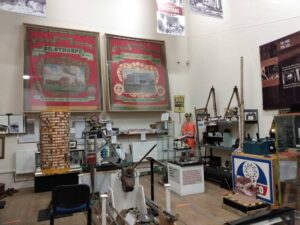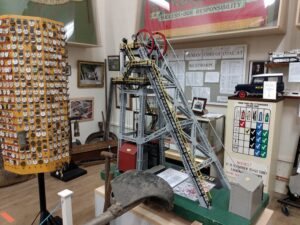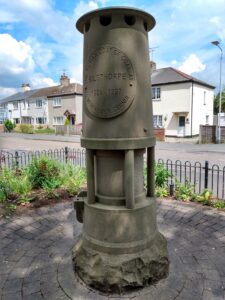Nottinghamshire’s mining heritage: Bilsthorpe Heritage Museum
 Until recently, Nottinghamshire’s landscape was scattered with towering pit heads and winding gears from the local coal mines. Nowadays, most evidence of this once colossal industry – one which employed tens of thousands of the local community – has vanished. At Bilsthorpe Heritage Museum, you can connect with this mining heritage and shape your understanding of how life changed in Nottinghamshire over the past century.
Until recently, Nottinghamshire’s landscape was scattered with towering pit heads and winding gears from the local coal mines. Nowadays, most evidence of this once colossal industry – one which employed tens of thousands of the local community – has vanished. At Bilsthorpe Heritage Museum, you can connect with this mining heritage and shape your understanding of how life changed in Nottinghamshire over the past century.
Located between Sherwood Forest and Southwell, Bilsthorpe Colliery produced coal from 1927 to 1997. Over seven decades it became central to the local community and was known as one of the most productive coal mines in Nottinghamshire. Unfortunately, it was also one of the deadliest, taking the lives of 77 miners and injuring many more.
Like many other local collieries, few traces of Bilsthorpe’s mine remain, although its legacy continues thanks to Bilsthorpe Heritage Society. This band of volunteers have gathered a significant collection of artefacts from the pit, providing them with a home when they would otherwise have been destroyed. In 2014, the Heritage Society used these artefacts to transform Bilsthorpe’s old squash court into a fascinating mining exhibition.
Interacting with the items on display – from iconic Davy lamps to models of fearsome mining machines – transports you to the heyday of the colliery. Harnesses and helmets are available for visitors to try on and experience a moment in the life of a miner. Feeling the weight of these objects for just a minute helps one imagine how resilient the miners needed to be to work underground shifting nine yards of coal per day.
 Special training equipment has been restored for visitors to practise their own mining skills. Pilot the joysticks controlling the cutting blades of a miniature ‘roadheader’ to see if you have what it takes to perform tunnel excavations through the rock face!
Special training equipment has been restored for visitors to practise their own mining skills. Pilot the joysticks controlling the cutting blades of a miniature ‘roadheader’ to see if you have what it takes to perform tunnel excavations through the rock face!
Detailed models of Bilsthorpe’s towers and winding gears help convey the scale of the former colliery. Demonstrations of these models reveal the secrets behind the inner workings of the pit head, allowing visitors to appreciate the gargantuan effort it took to hoist machines, material and people repeatedly up and down the mine shafts.
The museum is full of reminders of the perils of the pit, from breathing apparatus to newspaper cuttings retelling fatal events from Bilsthorpe’s past. A memorial wall listing the tragedies that occurred, including the 1927 disaster which claimed the lives of 14, really hammers home the human cost.
Tours are conducted by friendly, knowledgeable guides with backgrounds in working at the colliery. Their recollections of life in the mine really brings the history of Bilsthorpe alive, and reminds us that every artefact has a story behind it.
The museum also boasts an impressive collection of non-mining artefacts. Displays arefilled with old household furnishings from local communities, record players, and memorabilia from throughout the twentieth century. Sequined costumes from parades in Bilsthorpe, the pageantry and bright colours still intact, are among the highlights of this exhibition.
 A short walk from the museum is a poignant memorial garden, a lovingly curated plot cared for by the museum staff. Inside the gardens you can enjoy diverse flowers and trees, as well the Miners’ Memorial – an eight-foot sandstone Davy lamp. This monument is engraved with the names of the 77 who died at Bilsthorpe pit.
A short walk from the museum is a poignant memorial garden, a lovingly curated plot cared for by the museum staff. Inside the gardens you can enjoy diverse flowers and trees, as well the Miners’ Memorial – an eight-foot sandstone Davy lamp. This monument is engraved with the names of the 77 who died at Bilsthorpe pit.
Throughout the museum and garden, the Bilsthorpe Heritage Society has done a fantastic job maintaining the 70 year history of Bilsthorpe Colliery. Their work has created a unique tribute not only to the mine, but to the men and women whose lives were shaped by it.
Bilsthorpe Heritage Museum has now reopened, with seasonal opening hours as follows:
Summer: Monday, Wednesday and Sunday: 10am-4pm
Winter: Wednesday and Sunday: 11am-3pm
The museum charges no entrance or car parking fee, although donations are always welcome.
For those wishing to learn more, Bilsthorpe Heritage Museum is home to an archive of maps, photographs and newspaper clippings from the previous century, which visitors are welcome to look through.
For more information, please visit the museum’s website and Facebook page:
Alternatively, you can contact [email protected] to arrange a private tour.
Written by Will Parkinson, Economic Growth and Tourism Apprentice.
